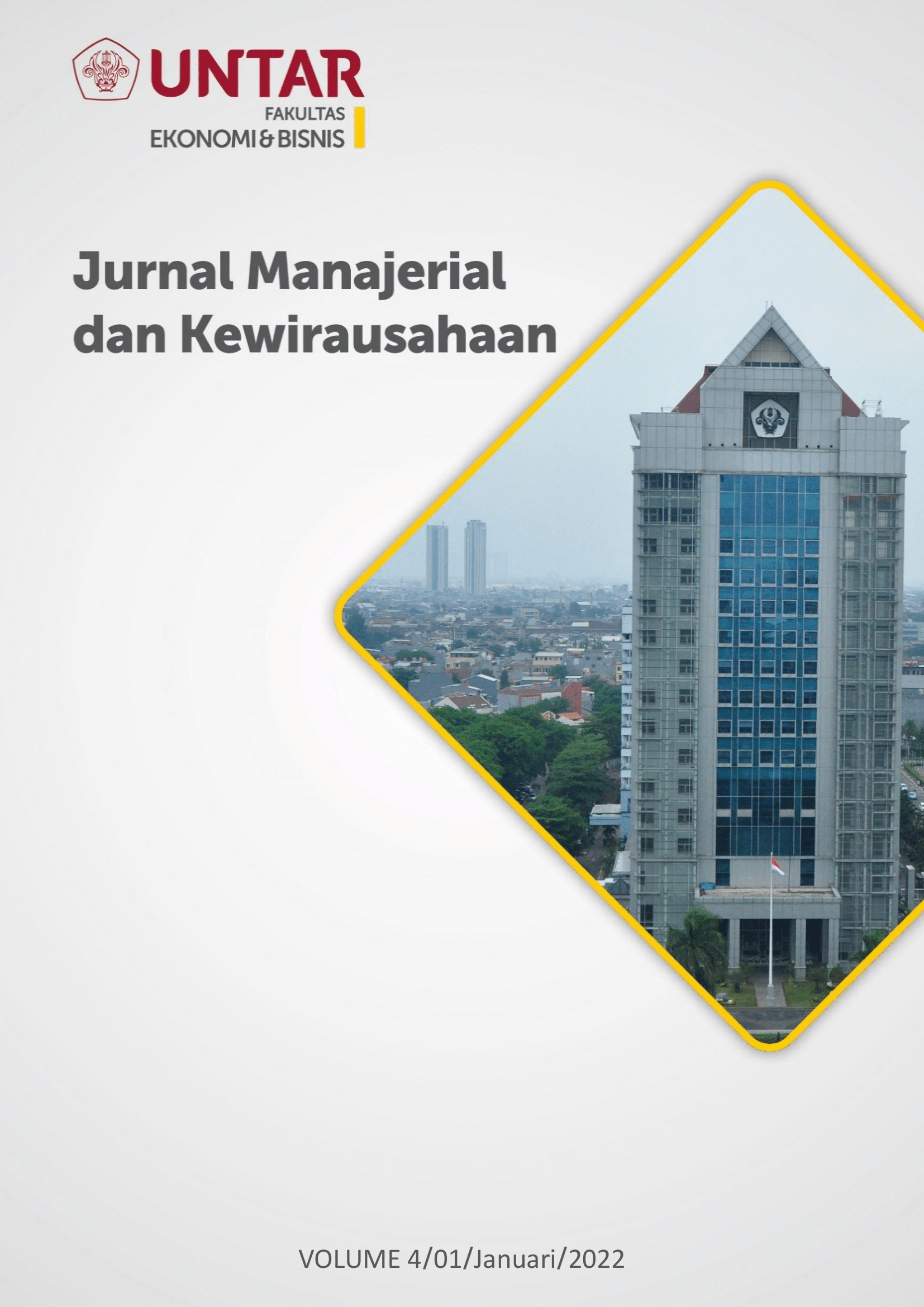Faktor-Faktor yang Berpengaruh terhadap Intensi Berwirausaha Mahasiswa Universitas Tarumanagara
Main Article Content
Abstract
Penelitian ini bertujuan untuk: 1) menguji pengaruh pendidikan kewirausahaan terhadap intensi berwirausaha siswa 2) menguji pengaruh sikap terhadap intensi berwirausaha siswa 3) menguji pengaruh latar belakang keluarga terhadap intensi berwirausaha siswa. Sampel dalam penelitian ini adalah 100 mahasiswa Universitas Tarumanagara, Fakultas Ekonomi dan Bisnis. Teknik pengambilan sampel yang digunakan adalah purposive sampling. Teknik pengumpulan data yang digunakan adalah kuisioner online melalui google form. Hasil penelitian menunjukkan bahwa 1) pendidikan kewirausahaan mempengaruhi intensi berwirausaha siswa, 2) sikap mempengaruhi intensi berwirausaha siswa, 3) latar belakang keluarga mempengaruhi intensi berwirausaha siswa.
This study aimed to: 1) examine the effect of entrepreneurship education, towards student’s entrepreneurial intention 2) examine the effect of attitude, towards student’s entrepreneurial intention 3) examine the effect of family background, towards student’s entrepreneurial intention The sample in this study were 100 students of Tarumanagara University, Faculty of Economy and Business. The sampling technique used is purposive sampling. Data collection technique used is online questionnaire through google form. The findings show that 1) entrepreneurship education affect student’s entrepreneurial intention, 2) attitude affect student’s entrepreneurial intention 3) family background affect student’s entrepreneurial intention.
Article Details
Section
This work is licensed under a Jurnal Muara Ilmu Ekonomi dan Bisnis Creative Commons Attribution-ShareAlike 4.0 International License.,/p>
References
Baughn, C., Chua, B., & Neupert, K. (2006). The normative context for women’s participation in entrepreneruship: a multicountry study. Entrepreneurship Theory and Practice, Vol. 30 No. 5, pp. 687-708.
Chairy. (2011). Pengaruh Karakteristik Entrepreneurial, Jenis Etnis, Jenis Kelamin Dan Profesi Orang Tua Terhadap Intensi Berwirausaha MahasiswavProsiding Dalam Rangkaian Seminar Internasional. Journal of Towards Excellent Small Business.
Cruz, L. D., Suprapti, N. W., & Yasa, N. K. (2015). Aplikasi Theory of Planned Behavior Dalam Membangkitkan Niat Berwirausaha Bagi Mahasiswa Fakultas Ekonomi Unpaz Dili Timor Leste. E-Jurnal Ekonomi dan Bisnis Universitas Udayana, 4(12), pp. 895-920.
Endah, & Eny. (2013). Pengaruh Kepribadian Dan Lingkungan Terhadap Intensi Berwirausaha Pada Usia Dewasa Awal. Buletin Ekonomi, Vol. 11, No. 1, hal 1-86.
Gibb, A. (2005). Towards the Entrepreneurial University: Entrepreneurship Education as a Lever for Change. National Council for Graduate Entrepreneurship.
Hannon, P. (2006). Teaching pigeons to dance: sense and meaning in entrepreneurship education. Education þ Training, Vol. 48 No. 5, pp. 296-308.
Honig, B., & Davidsson, P. (2000). The role of social and human capital among nascent entrepreneurs. Academy of Management Proceedings, Vol. 2000, August, pp. B1-B6.
Indarti, S. (2020). The effects of education and training, management supervision on development of entrepreneurship attitude and growth of small micro and enterprise. Attitude and growth of small and micro enterprise, 1 - 60.
Linan, F., & Chen, Y. (2009). Development and Cross-Cultural Application of a Specific Instrument to Measure Entrepreneurial Intentions. Entrepreneurship Theory and Practice, 33(3), 593-617.
Linda, F., Tatiana, M., Galina, S., & Tatyana, T. (2016). The impact of family support on young entrepreneurs' start-up activities. Journal of Business Venturing, 428-448.
Michel, J., Kotrba, L., Mitchelson, J., Clark, M., & Baltes, B. (2011). Antecedents of work family conflict: a meta-analytic review. Journal of Organizational Behavior, Vol. 32 No. 5, pp. 689-725.
Mwoma, T., & Pillay, J. (2016). Educational support for orphans and vulnerable children in primary schools: challenges and interventions. Issues in Educational Research, Vol. 26 No. 1, pp. 82-97.
Sivarajah, K., & Achchuthan, S. (2013). Entrepreneurial Intention among undergraduates: Review of literature. European Journal of Business and Management, Vol. 5, no. 5, pp. 172–186.
Sugiyono. (2012). Metode Peneitian Pendidikan (Pendekatan Kuantitatif, Kualitatif dan R&D), Bandung: Alfabeta.
Sukidjo. (2005). Peran Kewirausahaan Dalam Mengatasi Pengangguran Di Indonesia. Jurnal Economia, 1(1), 17-28.
Supranto. (2008). Statistik Teori dan Aplikasi. Jakarta: Penerbit Erlangga.
Susita, D. (2013). Pengaruh sikap kewirausahaan, kepribadian, kepuasan kerja, dan komitmen, terhadap efektivitas kerja karyawan kementrian perindustrian. Jurnal Kewirausahaan.
Weichun, Z., Jinyi, Z., Wai, K., & Steve, W. (2020). How harmonious family encourages individuals to enter enrepreneurship: a view from conservation of resource theory. Harmonious family encourages individuals, 333 - 339.
Wilson, F., Kickul, J., & Marlino, D. (2007). Gender, entrepreneurial self-efficacy, and entrepreneurial career intentions: implications for entrepreneurship education. Entrepreneurship Theory and Practice, Vol. 31 No. 3, pp. 387-406.
Yamin, S., & Kurniawan, H. (2009). Structural Equation Modeling dengan Lisrel – PLS. Jakarta : Penerbit Salemba.
Yasir. (2018). Entrepreneurial self-efficacy and intention: do entrepreneurial creativity and education matter? International Journal of Entrepreneurial Behavior & Research.
Zachary, R. (2011). The importance of the family system in family business. Journal of Family Business Management, Vol. 1 No. 1, pp. 26-36.

